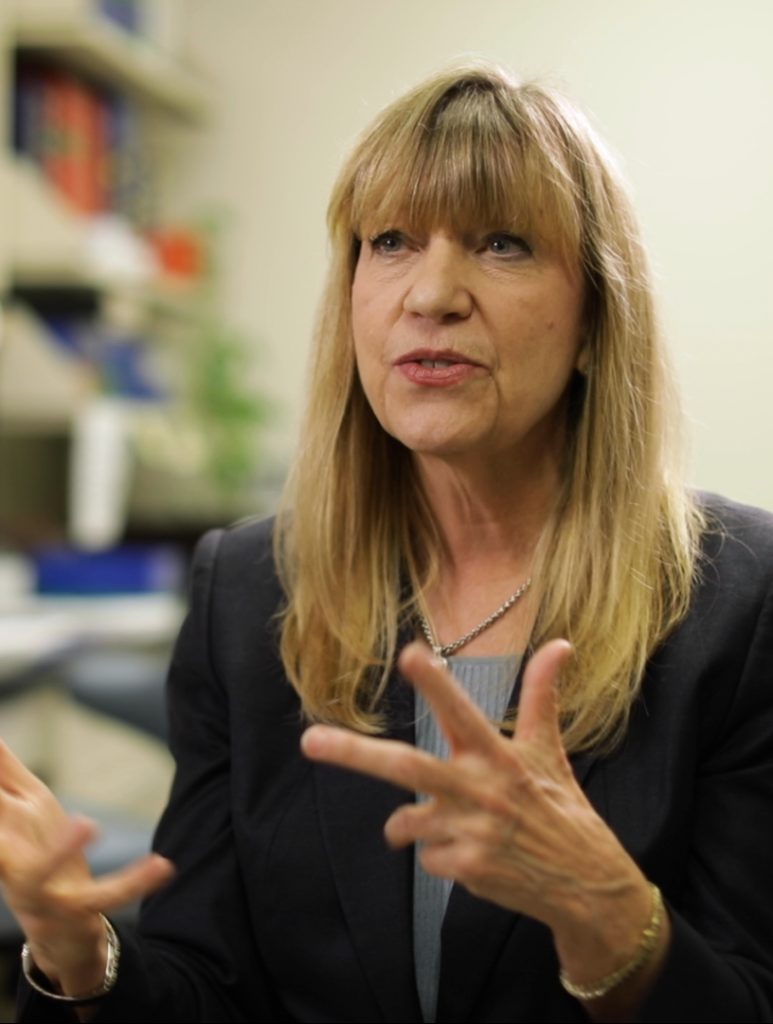Help advance knowledge of
Thoracic Aortic Aneurysm and Dissection
Learn more about ongoing research studies for thoracic aortic aneurysm and dissection patients.
Research studies are free to participate in, and in many cases, you can participate remotely. You should understand the risks and benefits of each study before enrolling. Individuals are encouraged to participate in multiple studies if eligible. The John Ritter Foundation will not have access to any of the information you share with these research studies or any research results, including from The John Ritter Research Program.
Dr. Milewicz, and my family who were a part of their research study, had no expectation that the gene or mutation would be identified in my lifetime. But a few years ago, it did happen. I got the call that Dr. Milewicz, and the research team that is funded by The John Ritter Foundation, found the genetic mutation in the LOX gene in our DNA. That phone call changed my life and the lives of my family. It changed our lives because now we know.
– Greg Weaver, John Ritter Foundation Board Member
If you’re a researcher and would like to learn about The John Ritter Foundation’s guidelines for promoting research studies please email info@johnritterfoundation.org.
John Ritter Research Program in Aortic and Vascular Diseases (JRRP)
The focus of JRRP is to discover more genes that cause thoracic aortic aneurysm or dissection, understand the genetic and environmental risk factors for developing thoracic aortic disease, and collect data on other symptoms associated with thoracic aortic disease.
Principal Investigator: Dr. Dianna Milewicz
Study contact: JRRP.research@uth.tmc.edu
Study website: https://med.uth.edu/internalmedicine/medical-genetics/john-ritter-research-program/
Who may be eligible: Individuals who have had a thoracic aortic dissection, individuals with a thoracic aortic aneurysm or who have another close family member with a thoracic aortic aneurysm or dissection. Individuals with dissection who are deceased may still be eligible if a DNA sample is available and the next of kin consents.
Montalcino Aortic Consortium (MAC)
MAC is an international registry of individuals who harbor pathogenic (disease-causing) variants in hereditary thoracic aortic disease (HTAD) genes. The registry is formed to collect data based on an individual’s underlying gene to improve medical management of aortic and vascular disease.
Principal Investigator: Dr. Dianna Milewicz
Study contact: MAC@uth.tmc.edu
Study website: https://www.montalcinoaorticconsortium.org
Who may be eligible: Individuals with variants in ACTA2, MYH11, MYLK, PRGK1, LOX, TGFBR1, TGFBR2, SMAD3, TGFB2, TGFB3 (the genes associated with Loeys-Dietz syndrome), FBN1 (Marfan syndrome), or COL3A1 (Vascular Ehlers-Danlos syndrome).


Dianna Milewicz, MD, PhD
Professor, UTHealth
Inspiring New Science in Guiding Healthcare in Turner Syndrome (INSIGHTS)
INSIGHTS is a multi-institutional patient registry that reviews an individual’s medical history to learn more about Turner Syndrome and improve medical care for those affected.
Principal Investigator: Inspiring New Science in Guiding Healthcare in Turner Syndrome (INSIGHTS)
Study contact: TSGA@TSGAlliance.org
Study website: http://tsgalliance.org
Loeys-Dietz Syndrome
Loeys-Dietz patients with a confirmed likely pathogenic or pathogenic variant in the genes TGFBR1, TGFBR2, SMAD3, TGFB2, or TGFB3 are eligible and encouraged to participate in the Montalcino Aortic Consortium. Please see information above.
Marfan Foundation Research Studies
The Marfan Foundation website has a list of various other research studies for the aortic and vascular disease community. Eligibility criteria, study contact information, and study summary can be found on the Marfan Foundation website.
Marfan patients with a confirmed likely pathogenic or pathogenic variant in FBN1 are eligible to participate in the Montalcino Aortic Consortium. See above.
Loeys-Dietz Syndrome
Loeys-Dietz patients with a confirmed likely pathogenic or pathogenic variant in the genes TGFBR1, TGFBR2, SMAD3, TGFB2, or TGFB3 are eligible and encouraged to participate in the Montalcino Aortic Consortium. Please see information above.
Marfan Foundation Research Studies
The Marfan Foundation website has a list of various other research studies for the aortic and vascular disease community. Eligibility criteria, study contact information, and study summary can be found on the Marfan Foundation website.
Marfan patients with a confirmed likely pathogenic or pathogenic variant in FBN1 are eligible to participate in the Montalcino Aortic Consortium. See above.
In-depth clinical and molecular characterization of Arterial Tortuosity Syndrome (ATS)
This study is characterizing the disease manifestations and evolution in individuals with ATS in order to optimize clinical management and care.
In addition, affected individuals can opt in to provide biological samples (blood sample, skin biopsy, aortic biopsy in case of surgery) for functional studies that could lead to a better understanding of the disease mechanisms. In addition, we are interested to evaluate obligate carriers of a mono-allelic (likely) pathogenic variant in SLC2A10
Principal Investigator: Dr. Bert Callewaert
Study contact:
Study website: https://www.cmgg.be/en/about-us/employees/department/-/1525
Who may be eligible: Individuals with molecularly confirmed or a high clinical suspicion for congenital or acquired cutis laxa who have clinical data available.
Integration of clinical data and disease mechanisms to unravel cutis laxa syndromes
This study is characterizing the disease manifestations and evolution in individuals with all types of cutis laxa in order to optimize clinical management and care.
In addition, affected individuals can opt in to provide biological samples (blood sample, skin biopsy, aortic biopsy in case of surgery) for functional studies that could lead to a better understanding of the disease mechanisms.
Principal Investigator: Dr. Bert Callewaert
Study contact:
Study website: https://www.cmgg.be/en/about-us/employees/department/-/1525
Who may be eligible: Individuals with molecularly confirmed or a high clinical suspicion for congenital or acquired cutis laxa who have clinical data available.

